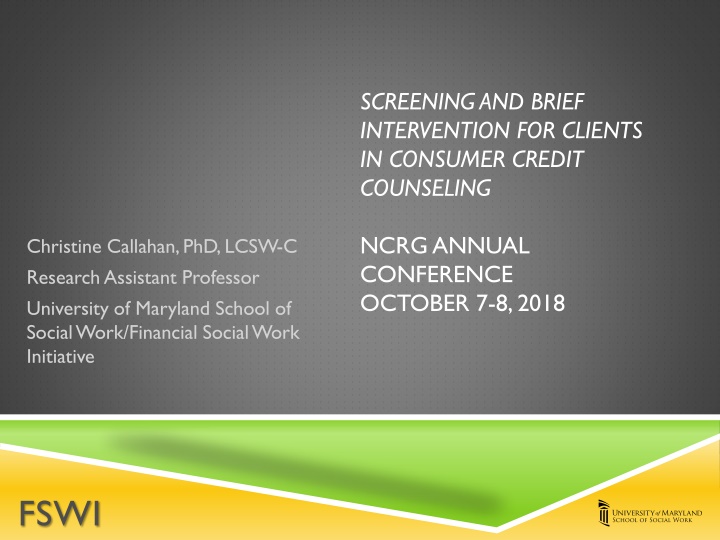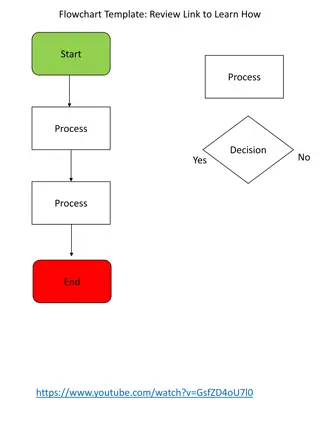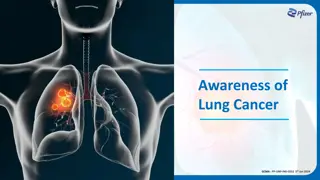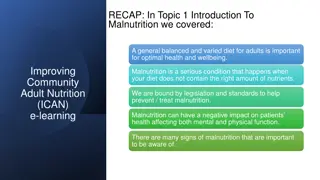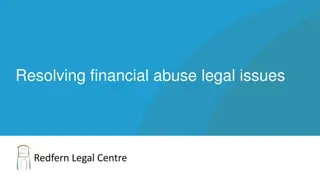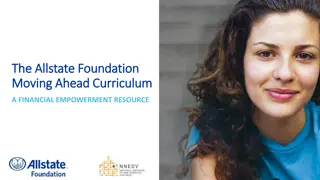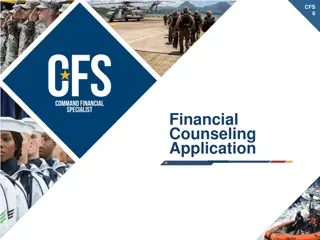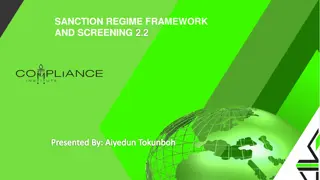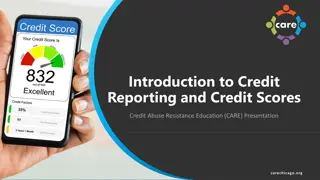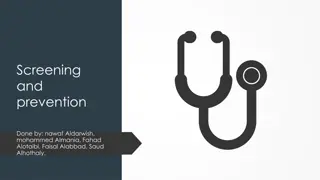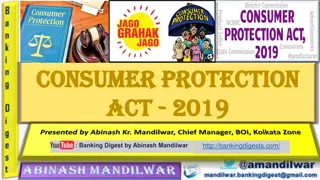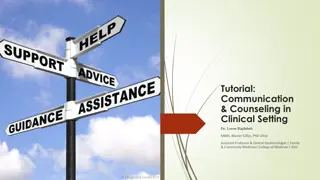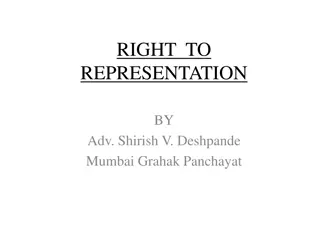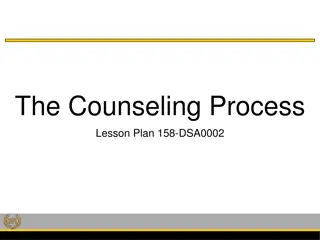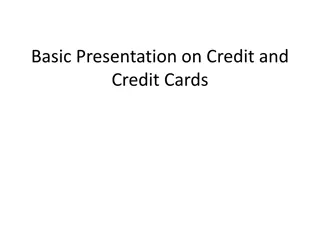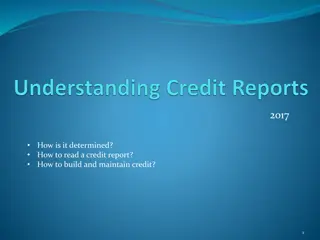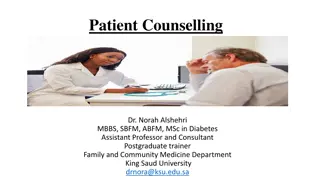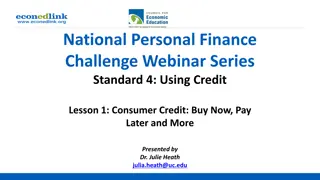Screening and Brief Intervention in Consumer Credit Counseling
This project explores the feasibility of implementing brief gambling screening by credit counselors and the implications of expanding gambling screening into credit counseling services. It aims to address the financial harms caused by gambling disorder and improve outreach to those affected. Partnering with organizations like the University of Maryland School of Social Work, the research seeks to estimate gambling prevalence and gather perspectives from industry professionals.
Download Presentation

Please find below an Image/Link to download the presentation.
The content on the website is provided AS IS for your information and personal use only. It may not be sold, licensed, or shared on other websites without obtaining consent from the author.If you encounter any issues during the download, it is possible that the publisher has removed the file from their server.
You are allowed to download the files provided on this website for personal or commercial use, subject to the condition that they are used lawfully. All files are the property of their respective owners.
The content on the website is provided AS IS for your information and personal use only. It may not be sold, licensed, or shared on other websites without obtaining consent from the author.
E N D
Presentation Transcript
SCREENING AND BRIEF INTERVENTION FOR CLIENTS IN CONSUMER CREDIT COUNSELING NCRG ANNUAL CONFERENCE OCTOBER 7-8, 2018 Christine Callahan, PhD, LCSW-C Research Assistant Professor University of Maryland School of Social Work/Financial Social Work Initiative FSWI
ACKNOWLEDGEMENTS This project was funded with a generous grant from the National Center for Responsible Gaming and supplemented with funding from the Woodside Foundation. Thank you to Paul Sacco, PhD, Jodi Jacobson Frey, PhD, Martin Hochheimer, MSW, Rachel Imboden, MSW, and Devon Hyde, MSW Also thanks to our colleagues and partners at Guidewell Financial Solutions
LEARNING OBJECTIVES Learn about the feasibility of brief gambling screening offered by credit counselors at a national credit counseling agency Learn about specific administrative and clinical implications for expanding gambling screening into credit counseling services FSWI
PARTNERING ORGANIZATIONS University of Maryland School of Social Work/Financial Social Work Initiative
PARTNERS IN ACTION FSWI
BACKGROUND Problem gambling and gambling disorder are unique because they are directly responsible for financial harms to individuals and their families including financial insecurity, severe debt and even destitution1,2 1-3% of individuals have a gambling disorder3 Fewer than 15% seek any professional help4 Little public funding is spent to improve outreach to persons with gambling disorders or for gambling treatment.5
WHY CREDIT COUNSELING? Consumer credit counseling agencies represent an ideal but underutilized setting to screen individuals Estimates of the prevalence of gambling and at-risk gambling are needed to determine the feasibility of screening individuals seeking credit and debt counseling. Perspectives from the credit counselors and administrators must be assessed to determine the appropriateness of screening and brief intervention in a credit counseling setting.
RESEARCH OBJECTIVES Aim 1: To develop estimates of gambling participation and at-risk gambling to assess the efficiency of screening 100% of callers to a national consumer credit counseling agency and compare prevalence to national estimates. To characterize the sociodemographic and financial characteristics of callers based on level of gambling risk. Aim 2: To test the feasibility of integrating brief screening for problem gambling into credit counseling.
AIMS QUANTITATIVE Aim 1: QUALITATIVE Aim 2: Single-item Gambling Participation Brief Biosocial Gambling Screen (BBGS)7 Sociodemographic & Financial Status: age, gender, race/ethnicity, education level, marital status, bankruptcy, total debt Semi-structured interview guide FSWI
MEASURES Aim 1: Single-item Gambling Participation Brief Biosocial Gambling Screen (BBGS)7 Sociodemographic & Financial Status: age, gender, race/ethnicity, education level, marital status, bankruptcy, total debt Aim 2: Semi-structured interview guide
BRIEF BIOSOCIAL GAMBLING SCREEN Pre-screening Question: Have you gambled 5 or more times in any one year of your life? If yes, During the past 12 months have you become restless, irritable, or anxious when trying to stop/cut down on gambling? During the past 12 months have you tried to keep your family or friends from knowing how much you gambled? During the past 12 months did you have such financial trouble as a result of your gambling that you had to get help with living expenses from family, friends or welfare? FSWI
SAMPLE Aim 1: Initial callers (n=2,438) to a national consumer credit counseling agency from March 1, 2017 to February 28, 2018 and the NESARC Survey (2001-2002).6 Aim 2: Credit counselors (n=8) and administrative leaders of national consumer credit counseling agency (n=3)
DESCRIPTION OF CLIENT SAMPLE 68% female Mean age of 48 years Slightly more than half were African American (39% White, 5.8% Hispanic, 3.3% Asian) 57.2% college educated 60,8% employed full-time Median income $39,354 Median total debt $66,294 FSWI
ENDORSEMENT OF BBGS ITEMS AND AT- RISK GAMBLING COMPARED WITH NESARC Credit Counseling N=2,438 NESARC N=42,038 F p STEM QUESTION: Have you ever gambled at least 5 times in any one year of your life? 17.1% 27.8% 135.58 <.001 Brief Biosocial Gambling Screening Questions n=417 n=11,138 BBGS 1: During the past 12 months, have you become restless, irritable or anxious when trying to stop or cut down on gambling? 6.3% 1.2% 1234.40 <.001 BBGS 2: During the past 12 months, have you tried to keep your family or friends from knowing how much you gambled? 6.1% 0.42% 304.26 <.001 BBGS 3: During the past 12 months, did you have such financial trouble as a result of your gambling that you had to get help with living expenses from family, friends, or welfare? 6.1% 0.11% 986.49 <.001 At-risk gambling (among lifetime gamblers) 9.0% 1.8% 117.54 <.001 FSWI
GAMBLING RISK BY SOCIODEMOGRAPHIC CHARACTERISTICS AND FINANCIAL STATUS Nongambler (n=2019; 92.98%) Low Risk (n=376; 15.45%) At-Risk (n=38; 1.56%) p Age (in years) Male gender 48.14 627(31.05%) 50.4 51.3 .001 .07 137(36.44%) 15(39.47%) White Race 766(39.28%) 139(37.67%) 13(35.14%) .75 Latino Ethnicity 121(6.21%) 15(4.07%) 1(2.70%) .20 African American Race 995(50.03%) 199(53.93)% 22(59.46%) ..37 Asian Race Native American Any College Education 61(3.13%) 7(0.36%) 1358(67.26)% 15(4.07%) 1(0.27%) 232(61.70%) 1(2.70%) 0% 25(65.79%) .64 -- .11 Never Married 867(42.94%) 154(40.96%) 18(47.37%) .55 Formerly Married 531(26.83%) 96(25.53%) 12(31.58%) -- Married 621(30.76%) 126(33.51%) 8(21.05%) -- Employed Fulltime 1218(60.33%) 242(64.36%) 18(47.37%) .07 Income $46,913.80 $49,613.17 $49,127.05 .54 Declared Bankruptcy 343(16.98%) 57(15.16%) 9(23.68%) .36 Total Debt $132,624.25 $141,849.58 $124865.10 .60 Reason for debt Employment 889(44.08) 166(44.15) 15(42.86 .98 Other Income 391(19.39) 68(18.09) 6(17.14) .80 Health & Medical 213(10.56) 29(7.71) 5(14.29) .79 Family & Personal 241(11.95) 58(15.43) 6(17.14) .12 Home & Environment 218(10.81) 44(11.70) 3(8.57) .79 Education 61(3.02) 11(2.93) 0 .58 FSWI
FOCUS GROUP THEMES SCREENING BRIEF INTERVENTION REFERRAL TO TREATMENT FSWI
FOCUS GROUP RESULTS-SCREENING Some counselors hesitant to ask all of the screening questions Fear of client defensiveness Some counselors believe that without the screening questions, clients will not admit to problem gambling. However, even with the screening questions, probing is needed. FSWI
SCREENING (CONTINUED) Differing definitions of gambling and problem gambling behavior among counselors and clients Using terms to normalize behavior, like entertainment might normalize behavior too much Gambling behaviors identified at multiple points throughout counseling session Gambling can be discovered through process of reviewing financial documents or in a budget discrepancy
WHAT THEY SHARED ON SCREENING CREDIT COUNSELOR: A lot of them [clients] are in denial, or are so embarrassed that they just don't want people to know of their situation, and I feel like sometimes when I ask clients the four questions, I can t say I feel so confident that they're telling the truth 100%, when I hear a hesitation at times. Well, they wouldn t really talk about it, but going through the course of seeing what the charges are, where their charges took place, all cash advances or literally getting cash off the debit card or credit card at the casino. Or when you look at their budget, and they really should be able to pay everything, you d have to kind of probe to find out what s causing it. FSWI
WHAT THEY SHARED ON SCREENING... ADMINISTRATOR: If the individual is having financial problems we re one of the resources that they would be reaching out to, but I don t always think that people are forthright with this problem, and I know that our counselors have to do a little sleuthing to kind of put it together. FSWI
FOCUS GROUP RESULTS-BRIEF INTERVENTION Credit counselors were helpful in considering design and implementation of brief intervention, but didn t want to alienate clients Direct discussion of gambling difficult and at times uncomfortable Another screening was at times viewed as excessive Importance of understanding the mental health piece FSWI
WHAT THEY SHARED ON BRIEF INTERVENTION I m comfortable with that, it s just if they say yes, it s the other three questions, because it s like trying to keep them from getting defensive. You build a rapport with the client, and I feel that once we go that deep you start losing that rapport. I remember one that was spending $200 a month on lottery tickets, but when I asked the question, they said no to the initial question, and I didn t feel comfortable enough to say, Well, wait a minute, how can that be a no? You just said yes. I think my first thoughts were another damn screening. FSWI
WHAT THEY SHARED ON BRIEF INTERVENTION They had done it again, and they re coming back to us for another payment plan on the debt, and still really not doing anything of treatment to help them with the gambling, just stopping the gambling long enough to get the credit cards or debts into a payment plan, to get financially stable but not actually doing anything to help themselves. Our folks are trained on that stuff [finances], but they re not really trained to change somebody s gambling behavior. FSWI
FOCUS GROUP RESULTS-REFERRAL TO TREATMENT Desire expressed for additional resources Frustration with limited nature of follow-up and lack of long-term relationship that precluded meaningful reinforcement of action steps Need for more strategies to talk about and define gambling behaviors that would fit within their time constraints Administrators and credit counselors wanted having a wider variety of resources for inclusion within action plans FSWI
WHAT THEY SHARED ON REFERRAL TO TREATMENT I refer people to Maryland Community Services Locator and the United Way. Both of them have websites that list all kinds of services, and I think that websites for something like that [problem gambling] are very nice for people to use, because there s less embarrassment. Certainly, I think a follow up would be helpful. A soft hand-off to connect them directly to the resource that can help them schedule an appointment. You know one of the key action items, one of the things a client walks away with as a result of our counseling sessions is a summary, what we call an action plan of next steps. So, it s accountability that they are going to follow up. FSWI
KEY FINDINGS The percentage of callers reporting at-risk gambling suggests that consumer credit counseling may be an appropriate and feasible place to screen for problem gambling Setting ideal for addressing problem gambling and financial stability Balancing effective brief screening with rapport-building Better handling of stigma and underreporting of gambling behaviors Use of a brief intervention is also appropriate, respecting time constraints and boundary of services
NEXT STEPS Develop a brief intervention in non-profit consumer credit and financial counseling organizations Test the effectiveness of this brief intervention model with clients with at-risk gambling behaviors in these settings Evaluate the feasibility and acceptability of the model with staff, leadership, and clientele FSWI
QUESTIONS? FSWI
REFERENCES 1. Moore, S., et al., Problem gambling among international and domestic university students in Australia: Who is at risk? Journal of Gambling Studies, 2013. 29(2): p. 217-230. 2. American Psychiatric Association. (2013). Diagnostic and Statistical Manual of Mental Disorders, Fifth Edition (5 ed.). Arlington, VA: American Psychiatric Publishing. 3. Browne, M., et al. (2016). Assessing gambling-related harm in Victoria: a public health perspective, Victorian Responsible Gambling Foundation, Melbourne. 4. Slutske, W. S. (2006). Natural recovery and treatment-seeking in pathological gambling: Results of two US national surveys. American Journal of Psychiatry, 163, 297-302. 5. Marotta, J., et al. (2017). 2016 survey of problem gambling services in the US. Boston, MA: Association of Problem Gambling Services Administrators. 6. Grant, B. F., Kaplan, K., Shepard, J., & Moore, T. (2003). Source and accuracy statement for wave 1 of the 2001-2002 National Epidemiologic Survey on Alcohol and Related Conditions. Bethesda, MD: National Institute on Alcohol Abuse and Alcoholism. 7. Gebauer, L., LaBrie, R., & Shaffer, H. J. (2010). Optimizing DSM-IV-TR classification accuracy: A brief biosocial screen for detecting current gambling disorders among gamblers in the general household population. Canadian Journal of Psychiatry, 55(2), 82-90.
CONTACT US Paul Sacco, PhD, MSW psacco@ssw.umaryland.edu Jodi Jacobson Frey, PhD, LCSW-C jfrey@ssw.umaryland.edu Christine Callahan, PhD, LCSW-C ccallahan@ssw.umaryland.edu FSWI
